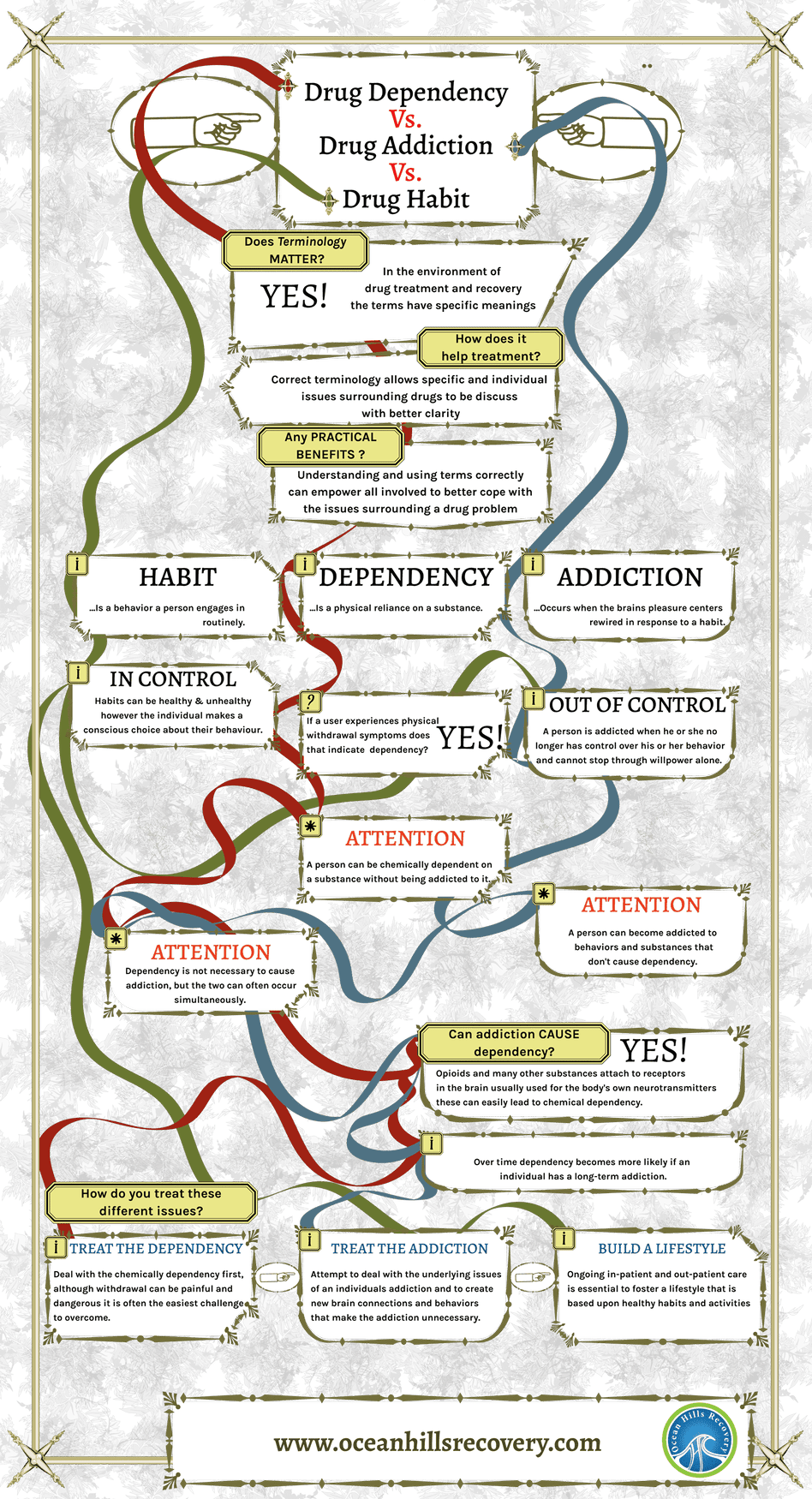Terms like “substance abuse,” “addiction” and “drug dependency” may often be used interchangeably in casual conversation surrounding the issues of problematic drug use. However, in the environment of treatment and recovery, each of these terms has a specific definition.
Understanding these definitions is more than an exercise in semantics. The language of addiction provides an important way to discuss the specific problems facing an individual who struggles with substance use. A person with drug dependency will require different types of intervention and respond differently to treatment than someone with a problematic drug habit.
Understanding the terms and using them correctly can empower you to better understand your circumstances or the circumstances of your loved one who is facing treatment.
Continued after image…
Dependency vs Addiction vs Habit
In general terms, a habit is a particular behavior that a person engages in as part of a routine. Habits can be healthy or unhealthy depending on the behaviors in question. Exercising each day before work is an example of a healthy habit. Other habits may not be very healthy: regular binge drinking, drug use, gambling or even eating too many sweets. However, even an unhealthy habit is not necessarily an addiction.
Where habits cross over into addictions is when the user loses control over his or her behavior. Addictions are compulsive; an individual will experience strong and uncontrollable cravings. These cravings lead to compulsive behavior even if a person no longer enjoys that behavior or recognizes that it’s harmful.
Addiction is caused by altered brain biology. The reward system of the brain becomes essentially rewired toward use. In order to overcome an addiction, an individual may need to undergo therapy to reprogram the brain and develop new behaviors to replace the destructive addiction.
Dependency on the other hand is a purely physical experience. It occurs when the body becomes accustomed to the presence of a particular substance and experiences withdrawal symptoms when that substance is no longer taken. This occurs when the body becomes accustomed to the presence of certain chemicals and stops producing its own analogous hormones; when the substance is taken away, the body undergoes a period of withdrawal before being able to produce its own neurotransmitters like dopamine.
Addiction and Dependence Do Not Always Occur Simultaneously
It’s important to recognize that addiction can occur with or without physical dependence.
For example, many behaviors can become habit-forming and eventually addictive even if no physical dependency is developed. Gambling, pornography, online gaming and other behaviors can be addictive without any physiological component. Some drugs, including methamphetamines, have relatively mild withdrawal symptoms but can still cause severe addiction.
Some people also develop a physical dependency on drugs without the accompanying addiction.
For example, people who take prescription painkillers can become physically dependent on them without developing a craving for them or a desire to use them recreationally. Babies born to drug-using mothers can also be born with drug dependency and experience withdrawal symptoms after birth.
Because opioids attach to receptors in the brain usually used for the body’s own neurotransmitters, it is easy to develop chemical dependency on these drugs. Many other substances can create a similar type of dependency: nicotine, anti-depressants, caffeine and even sugar can all produce withdrawal symptoms.
Many people who are addicted to a substance will also develop dependency to it from frequent use. Treating the dependency without addressing the underlying addiction will not have long-term success for recovery.
Treating Dependency vs Addiction
The period of withdrawal from substances like opioids or alcohol can be extremely unpleasant and even dangerous. Withdrawal symptoms may be similar to an illness; they might include fever, vomiting, heightened blood pressure and pain. These symptoms generally peak within a few days of drug cessation.
When someone has developed a chemical dependency to a substance, cessation of that substance should generally occur under a physician’s guidance. In some cases, a replacement substance can be used as a stepping stone to reduce the severity of withdrawal symptoms and ease a person through that transition.
Once this period of detoxification has ended, the work of addiction recovery can begin. Successfully treating addiction means understanding the underlying causes of that addiction and training the brain to form new connections and behaviors. For this reason, ongoing therapy in both inpatient and outpatient settings is essential for most people to stay on the path of recovery.
For more information about our program or to inquire about seeking treatment, contact Ocean Hills Recovery today.














